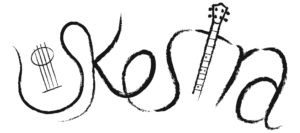How do our ukestras work practically and financially? Keep reading this page and you’ll find out!
We want you to know how we can help you play music, and how you can help yourself get the best out of your own participation.
No, we are not going to tell you to practise. But we are going to help you figure out music and its relationship with ENJOYING YOURSELF!
And since you have chosen to pay to have fun and learn, we figure you should know some of the ways that you can make that bit easy.
As Ralph the Ukestran says –
It’s not the only way to make music, but it is the only way I’ve found to make music!
Read on to find out…
- What is a Ukestra?
- What you can expect from a Ukestra
- What we expect from you
- Advice for those performing
- What to do when you attend a Ukestra session
- Payment options for attending a Ukestra session
- Discounts for attending more than one Ukestra Session in the same week.
What is a …  ?
?
A ukestra is an ukulele orchestra. Our ukestras are fun, low stress and entertaining places to learn music together. Teachers from The Sum of the Parts (music) are experienced musicians who encourage you to find your own level of achievement.
Making music together is the perfect antidote to the feeling that you will never be able to play music. You can. What’s more, you’ll enjoy the company of others.
Talk to us about the various options that exist for performing. It will push you that little bit further (if that’s what you want).
What you can expect from a Ukestra
- Tuition in ukulele techniques, music theory, singing and performance skills.
- A diverse session which tries to meet the needs of different skill levels from beginner to advanced players.
- A low stress environment – you come here to relax and learn. So do we!
- A ukestra leader who actively assesses the needs of individual students and flexibly endeavours to tailor the program to those needs.
- Reasonable expert knowledge – yes, we know a lot, but sometimes we make mistakes. In some instances the best teachers can be your fellow students!
- If we don’t know the answer to your question, we will attempt to supply a more informed response the next week.
- A lesson plan that is subject to change (depending upon who attends and what their needs are on the day).
- We provide performance opportunities locally, interstate and yes, we’ve been to Hawaii!
- Time for socialising with an engaged and informed ukulele community.
- We encourage you to connect with others outside of ukestra sessions. However, it’s up to you to share your contact details and we will not share that information with other members without your consent.
What we expect from you (hints: participate, listen, respect others, have fun!)
- Your active participation.
- To play (and sing) nicely with others – sensitively enough so that you blend with the group sound, but strongly enough so that you and we can hear. If we can hear you then we can help you improve.
- Respect – for others’ level of skill and ability, and for them as human beings. There are people here from all walks of life, lifestyles and political persuasions.
- To listen – to the ukestra leader and to each other.
- Observe group etiquette and follow instructions (eg. don’t play when the ukestra leader is talking).
- To help others, where they welcome that assistance. However, have sensitivity when they do not want help.
- When you are soloing, go for it! Make mistakes. Improve. Don’t repeat the same mistake twice (unless it sounds good!)
- To leave your cares at the door and enjoy yourself. Music is great therapy, but ukestra leaders are not therapists.
- To tell us when you think you’ve had enough and won’t be coming back. This is perfectly understandable in so many ways – you may have learned/gained all that you were seeking, have health issues, be moving away or going on extended holidays – we just like to know because we care and wonder!
- Follow instructions from the performance director at rehearsals and
 performances.
performances. - During a performance watch the director and hear your fellow performers. Be aware of the audience and interact – with your eyes, with your smile, with the music you are playing.
- At the earliest rehearsals, try to do parts that you find challenging and that advance your skills. Practice these at home, but approaching performance, decide which part (refer to point 4 below) you are successfully contributing to the group sound and STICK to it.
- Acknowledge your limitations and aspirations with yourself.
- Feel free to discuss your options, limitations and aspirations with the performance director.
- There are heavenly rewards for those who successfully play complex parts … however, the single chord thumb strum is not only a vital component of a ukestra performance, it is a noble and important thing!
- Aim to perform without a music stand. If you need to see music or lyrics, consider options such as a condensed version taped to the back of a very co-operative and considerate person in front of you, or a uke-borne music holder.
- If you learn your part and the arrangement, it allows you to engage better with your fellow musicians and the audience. It is also excellent memory practice – your mental fitness is like your physical fitness, use it or lose it!
- Join the Folk Club to cover your legal obligations and to be part of a broader musical community.
- Sing!
What you need to do when you attend a Ukestra session
Please come up and say hello to the ukestra leader and have your name recorded on the attendance roll. If you become a regular, then just check in with them to make sure they have recorded your attendance correctly. For instance is this your second session in a week?
Payment options for attending a Ukestra
You can pay for your ukestra attendance in one of two ways. Of course you can just pay in cash each week to the Ukestra leader at the beginning of a ukestra session ($20 per session). But we think you’d prefer to minimise hassle with a uketen.
To save money and time, you can purchase attendances in blocks of ten. We call them a ‘uketen’. When you attend a ukestra session, your attendance is recorded and the amount of that attendance is deducted from your balance. A uketen provides a significant discount on the casual rate, and you don’t have to worry about having cash available each week. As at 1 July 2020 a uketen costs $155. That’s $15.50 per session.
Uketen conditions
- This is for ten sessions, which has to be used within one year from the date of purchase.
- This can be used by other people nominated by you, by prior arrangement with us.
- We send you a fresh tax invoice when you have two credits remaining. This is NOT a demand for payment, just a polite and easy reminder that you have nearly used up your uketen.
- If you can no longer attend any of the Ukestra sessions and request a refund of your remaining balance, there will be a $25.00 processing fee. The attendances you have already made will be charged at the current casual rate.
Stay in touch. Most importantly – keep playing.
Well done! You’ve just about reached the end. If you are reading this then you have more than likely already done our 2 hour beginners session. But maybe you are reading this and have already been playing for a while. Don’t forget that each Ukestra is always welcoming, although you may need to be patient with yourself during some of those sessions if the complexity gets beyond you. The Newkestra (Saturday mornings) is different, as it always endeavours to remain at a just-beyond-beginner level.
We do occasionally change venue, and the best way to stay in touch is through our mailing list. If you are not on it, please just tell us. Or you can easily do it yourself!
However you may also want to stay in touch through Facebook (the Ukastle Ukestra and/or The Sum of the Parts).
Don’t forget to check out the menu at the top of this page where’ll you will find a calendar and lots of music to download.
Another useful website is Danielle Scott’s Ukulele Central website.
Explore the net, there is so much uke-stuff out there.
And most important – enjoy yourself – we think that that is what making music with others is mostly about.
Mark Jackson, Jane Jelbart, Kathy Wilson, John Wallace and Susan Gleeson

